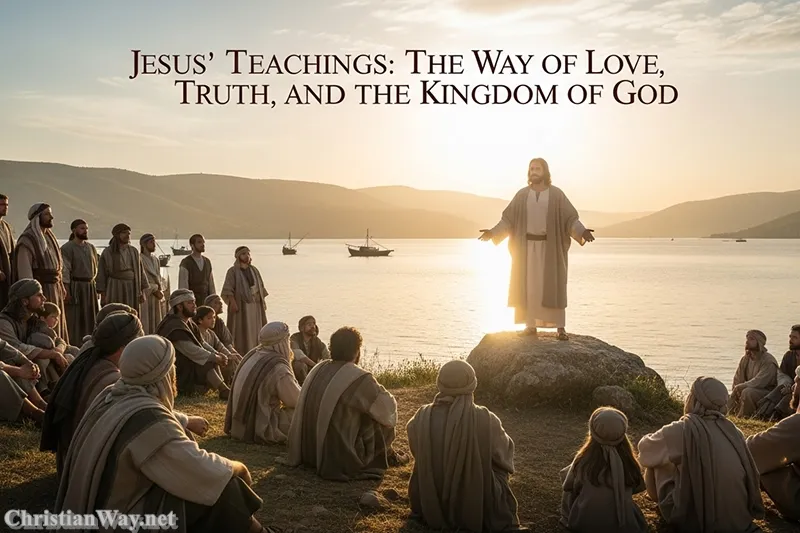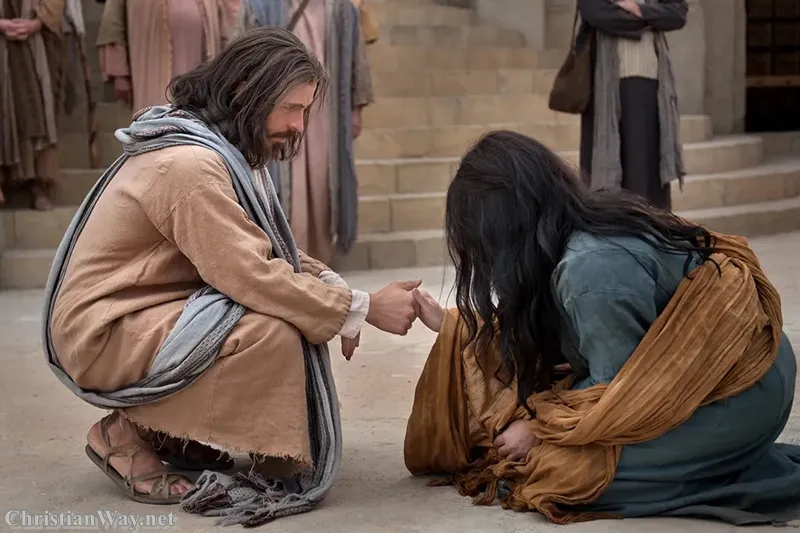Every human soul, at some moment, asks what life is truly about — what it means to live rightly, to love sincerely, and to walk in peace. For those who turn their eyes toward Jesus Christ, the answer is not a theory or a rulebook, but a living Person whose words and deeds unveil the heart of God Himself.
Dear friends in Christ, the teachings of Jesus are not abstract moral lessons; they are the living expression of divine love entering human history. In every parable, every sermon, and every gentle encounter, Jesus shows us what it means to live as children of the Father — free, merciful, truthful, and whole. His words are not meant to be admired from afar; they are meant to be lived, for they hold the power to transform the human heart.
The world often speaks of success, power, and self-fulfillment. Jesus speaks instead of humility, forgiveness, and love — a love that stretches even to one’s enemies. His teachings are both simple and demanding, consoling and challenging, for they call us not merely to behave better but to become new.

Let us walk slowly, then, through the heart of Christ’s teaching — that we might hear His voice again, as though He were speaking directly to us.
The Heart of Jesus’ Message: The Kingdom of God
When Jesus began His public ministry, His first words were these: “The Kingdom of God is at hand; repent and believe in the Gospel” (Mark 1:15). Everything He taught and did flowed from this reality — that God’s reign was breaking into the world, not as an empire of force but as a kingdom of grace and love.
To understand Jesus’ teachings, we must see them in light of this Kingdom — a Kingdom that transforms hearts before it transforms societies. It is not limited by geography or politics but lives wherever God’s will is done in love. The Kingdom of God, He said, is like a mustard seed: small, humble, and hidden — yet destined to grow until it fills the earth (Matthew 13:31–32).
In this Kingdom, greatness is found in service, strength in mercy, and life in self-giving love. “Whoever wants to be first must be the servant of all” (Mark 9:35). These words overturn every worldly hierarchy. In the teaching of Jesus, true power is not domination but love that stoops to wash the feet of another.
The Beatitudes: The Charter of the Kingdom
The Blessings of a New Humanity
When Jesus sat upon the mountain and spoke the words we now call the Beatitudes (Matthew 5:1–12), He was not simply giving moral advice; He was painting the portrait of a redeemed humanity — what the heart looks like when it belongs to God.
“Blessed are the poor in spirit, for theirs is the kingdom of heaven.”
“Blessed are the meek, for they shall inherit the earth.”
“Blessed are the merciful, for they shall obtain mercy.”
Each Beatitude is a paradox — turning human wisdom upside down. Poverty of spirit, meekness, hunger for righteousness — these are not traits the world celebrates. Yet Jesus calls them blessed, because they open the soul to God’s transforming grace.
In the teachings of Jesus, the Beatitudes are not rules to follow but an invitation to become. They reveal the path to joy not through self-sufficiency, but through surrender; not through possession, but through purity of heart; not through comfort, but through compassion.
Saint Augustine once said, “The Beatitudes are the perfect pattern of the Christian life.” They describe what it means to be conformed to Christ — to share His humility, His mercy, His purity, and His peace.
Love: The Fulfillment of All Teaching
The Commandment of Love
When asked which commandment was the greatest, Jesus replied without hesitation:
“You shall love the Lord your God with all your heart, and with all your soul, and with all your mind… and you shall love your neighbor as yourself.” (Matthew 22:37–39)
Here lies the essence of Jesus’ teachings — love of God and love of neighbor, united as one. The two cannot be separated. Love of God without love of neighbor becomes illusion; love of neighbor without love of God loses its source.
Jesus went even further: “Love one another as I have loved you” (John 13:34). This is not simply a call to kindness, but to divine imitation — to love with the same self-giving, sacrificial love that led Him to the Cross.
The Parable of the Good Samaritan
In the Good Samaritan (Luke 10:25–37), Jesus answers the question, “Who is my neighbor?” not with theory but with story. A wounded man lies by the road, ignored by the pious but cared for by a Samaritan — an outsider, despised by many.
Here Jesus reveals that compassion knows no boundaries. The neighbor is not defined by proximity, religion, or nation, but by mercy. Every person in need is our neighbor, and every act of love extends the Kingdom of God.
Forgiveness and Reconciliation
The Heart that Frees Others
Among the most challenging of Jesus’ teachings is His command to forgive. “Love your enemies and pray for those who persecute you” (Matthew 5:44). To the human heart, wounded and proud, this may seem impossible. Yet Jesus not only taught it — He lived it.
From the Cross He prayed, “Father, forgive them, for they know not what they do” (Luke 23:34). In those words lies the summit of divine mercy. He shows that forgiveness is not weakness, but strength; not resignation, but victory over evil.
In teaching His disciples to pray, Jesus included the petition: “Forgive us our trespasses, as we forgive those who trespass against us” (Matthew 6:12). To receive mercy, we must become merciful. Forgiveness releases both the offender and the offended from the chains of hatred.
The Parable of the Prodigal Son
Nowhere is the mercy of God more vividly portrayed than in the Parable of the Prodigal Son (Luke 15:11–32). The father who runs to embrace his lost child is the image of God Himself — patient, watchful, overflowing with compassion.
Through this story, Jesus teaches that no sin is too great, no distance too far, for the Father’s love to reach. Repentance is not humiliation but homecoming. The heart of God rejoices more over one sinner who returns than over ninety-nine who never strayed.
Truth and Integrity of Heart
The Sermon on the Mount
In the Sermon on the Mount, Jesus moves from outward obedience to inward transformation. “You have heard that it was said… but I say to you…” (Matthew 5:21–48). He deepens every commandment, calling for purity not only of actions but of intention.
To avoid murder is good; to cast away anger is divine. To avoid adultery is good; to keep the heart pure is divine. Jesus calls us to truth in the hidden places — to a holiness that no one sees but God.
“Let your yes be yes, and your no be no” (Matthew 5:37). In a world of half-truths and masks, this simple command pierces deeply. Authenticity, integrity, and sincerity are the marks of the disciple. The teachings of Jesus lead not to external show, but to inner freedom.
Prayer: The Soul’s Dialogue with God
When the disciples asked, “Lord, teach us to pray,” Jesus gave them the words of the Our Father (Matthew 6:9–13) — a prayer so simple a child can recite it, yet so profound that saints have meditated on it for centuries.
It begins not with requests, but with relationship: “Our Father.” In those two words lies the essence of the Gospel — that God is not distant but near, not a tyrant but a loving Father who knows our needs before we ask.
Each petition of the Lord’s Prayer reflects Jesus’ own teachings: reverence for God’s name, desire for His Kingdom, trust in His providence, willingness to forgive, and longing to be delivered from evil.
Prayer, in Jesus’ understanding, is not performance but communion. He taught, “When you pray, go into your room and shut the door and pray to your Father who is in secret” (Matthew 6:6). True prayer unites the soul to God in simplicity and love.
Wealth, Possessions, and the Heart’s Freedom
The Danger of Riches
Jesus spoke often about money — not because He despised it, but because He knew its power to enslave the heart. “Where your treasure is, there your heart will be also” (Matthew 6:21).
He told the rich young man, “Go, sell what you have and give to the poor, and you will have treasure in heaven; then come, follow Me” (Mark 10:21). The issue was not the possession of wealth, but the possession by wealth — when material goods become a rival god.
The teachings of Jesus invite us to live with open hands, to use what we have for love, and to trust that the Father’s care is enough. “Seek first the Kingdom of God, and all these things will be added to you” (Matthew 6:33).
Humility and Service
In the night before His Passion, Jesus took a basin of water and washed His disciples’ feet. When He finished, He said: “I have given you an example, that you also should do as I have done to you” (John 13:15).
This moment reveals the core of His teachings — that true greatness is found in humility. The Master becomes the servant; the Lord stoops to cleanse the feet of sinners. Every act of service, however small, becomes sacred when done in love.
He warns His followers: “Whoever exalts himself will be humbled, and whoever humbles himself will be exalted” (Matthew 23:12). In God’s economy, humility is the door through which grace enters the heart.
The Cross: The Final Teaching of Love
All of Jesus’ words find their fulfillment in the Cross. There, love and truth meet; mercy and justice embrace. The Cross is not merely the end of His ministry — it is the culmination of His teachings.
He taught us to love our enemies; on the Cross, He forgave them.
He taught us to lay down our lives; on the Cross, He did so.
He taught that the grain of wheat must die to bear fruit; on the Cross, He became that seed.
Every command, every parable, every blessing points toward Calvary, where love proved stronger than death. And from the empty tomb, the Risen Christ confirms that His way — the way of love — is the way to life eternal.
Living the Teachings of Jesus Today
To follow Jesus’ teachings in our time is not to retreat from the world but to live within it as light and salt. It means responding to hatred with peace, to greed with generosity, to despair with hope. It means forgiving when it is hardest, praying when it feels silent, and loving when it costs the most.
His words are not relics of the past; they are alive today through the Holy Spirit who writes them upon our hearts. The disciple is not one who merely studies Jesus’ teachings but who is shaped by them — until, little by little, Christ Himself is formed within.
Reflect and Pray
Dear friends, as we listen again to the teachings of Jesus, may they no longer remain distant ideals but become the living rhythm of our days. May His words dwell richly in us — purifying, guiding, and strengthening our hearts to walk in love.
Let us pray:
Lord Jesus Christ, Word of the living God,
Let Your teaching take root within us.
Make us poor in spirit, pure in heart, merciful in love.
Teach us to forgive as You forgive, to serve as You serve,
And to walk always in the light of Your Kingdom.
Amen.
— Fr. John Matthew, for Christian Way





